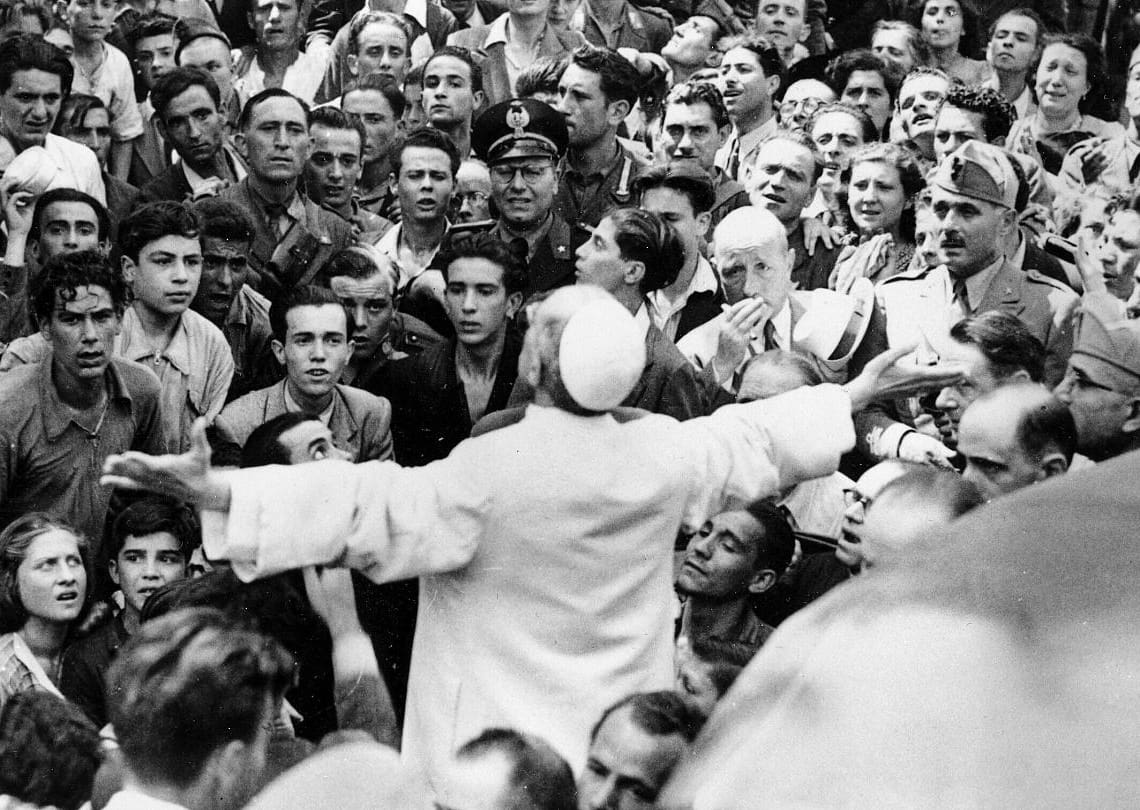The transformation of Nazism into a dominant force in continental Europe did not strengthen the position of traditionalism, as conservatives had hoped, but led to the establishment of a totalitarian “new order.” Totalitarianism effectively destroyed all old institutions. The rule of law, personal and political freedoms, and government accountability were abolished. Moreover, even the institution of the church and religion were threatened.
The Nazi ideology was extremely critical of the influence of Christianity on the fate of European civilization. For the Nazis, the activities of the Christian Church were equal to “Jewish influence.”
The Nazis perceived the traditional virtues of Christian doctrine, such as mercy, justice, and universalism, as traits that negatively affected the Aryan virtues of Europeans.
The influence of Christian churches was severely limited. Gradually, the Nazis banned the activities of all social church organizations: trade unions, relief committees, and youth organizations. A ban was also imposed on Christian publications. Even small-circulation episcopal newsletters were banned.
The Nazis planned to significantly revise the church’s teachings. The Old Testament and the apostolic epistles were to be banned. The Nazis had plans to place Hitler’s Mein Kampf next to the Bible in churches, and to replace traditional crosses in churches with swastikas.
It became clear that if Nazism continued to dominate, the influence of Christianity would be significantly reduced, and Christianity itself would be changed beyond recognition. The gradual realization of this fact caused a real shock among many contemporaries of the already banned Christian parties, priests, or Christian intellectuals.
The dubious prospects of Christianity led to the emergence of the phenomenon of “Christian resistance” in Nazi-controlled countries. Individual Christian intellectuals, members of banned Christian parties, priests, and sometimes church hierarchs expressed a position that ran counter to the Nazi ideology. Even more hierarchs tried to avoid any public support for the Nazis’ actions and secretly rescued groups persecuted by the Nazis. This was the position of Pope Pius XII. Refraining from publicly supporting the Nazis, Pius XII gave unofficial orders to monasteries to hide political opponents of Nazism and Jews.
Gradually, Christian groups emerged in the resistance movements of Italy and France and began an armed struggle against Nazism.
The existence of the “Christian resistance” and radical polarization with the totalitarian parties turned the “democratic Christianity” movement into one of the most prominent forces in post-Nazi Europe.
The struggle against totalitarian Nazism and the potential threat of totalitarian communism led to the formation of the most original European phenomenon of the postwar period: powerful Christian democratic movements.
Although most European Christian democratic parties were founded in the second half of the 1940s, the last years of World War II were key to the crystallization of the intellectual foundation of Christian democracy.
In 1943, the French personalist philosopher Jacques Maritain published his book Christianity and Democracy. Maritain’s book outlined the main approaches and ideological foundations of Christian democratic movements. Maritain stated that due to the short-sightedness of political elites, Europe faced a choice “between communism, which fights against God, and Nazism, which tries to subjugate God to its own purposes.”
In Maritain’s view, postwar Europe could achieve lasting peace only if “Christianity and democracy are reunited.” For Maritain, the key question was whether Christians would be able to transform themselves into citizens who could take responsibility for the fate of their homeland, Europe, and Christian civilization in general.
The work of Jacques Maritain is quite illustrative and can serve as an example of the transformation of the ideological views of the generation that survived World War II. Back in the 1920s, Maritain belonged to the Catholic group Acción Française, which professed authoritarian and corporate views. Just like Maritain, large groups of Europeans, faced with the realities of Nazism, abandoned their illusions about authoritarianism and rediscovered the role of the church and Christian teaching.
If Jacques Maritain’s book influenced mostly elite groups, the change in the position of the Roman Church was much more important for the masses. In his Christmas message of 1944, Pope Pius XII declared that democracy was the form of government that was closest to Christian ideals. This statement finally legitimized the political activity of Catholics by the church and contributed to the formation of democratic Catholicism.
Pius XII’s Christmas message was all the more significant because those territories in postwar Europe that were liberated from Nazi rule and did not fall under Communist occupation were largely Catholic. Even in the western zones of occupied Germany, Catholics made up an approximately equal proportion of the population compared to Protestants.
Jacques Maritain’s book and Pius XII’s message did not so much shape the public demand for a combination of Christianity and democracy as reflect it. It was these two political figures who finally crystallized the intellectual outlines of Christian democracy.
Author: Konstantin Kanishev




